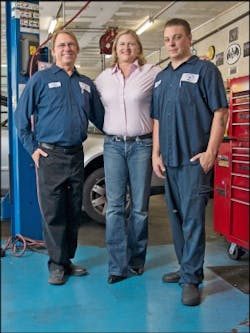Henry Carter has worked on cars his entire life, getting his “official” start in the auto industry at 14 by helping his dad restore Mercedes-Benz vehicles.
And the one thing he’s learned in the 42 years since is that an owner never stops learning.
“Every minute is a new lesson in this industry,” he says. “Once you think you have it, something new is going to come along and you have to adjust.”
That’s a lesson he’s already passed down to his son, Dan Carter, a talented technician in his own right and the future owner of the Carter family business, Water Star Motors, in Santa Cruz, Calif.
As with many things in life, though, Dan was forced to learn this lesson the hard way.
For three years, Dan, now 29, had worked as the “owner in training” of Water Star Motors, learning from his parents the numbers, procedures and daily tasks that go with running a successful shop. And it was in this role that Dan suggested a money-saving change in the business: Him making the switch to service advisor.
He was confident he could do the job, and, he figured, it would save the shop a lot of money.
“Daniel said he could do it much better than our current service advisor could and save us a lot of money,” says Lisa Carter, who has run the business side-by-side with her husband since it opened in 1993. “By coincidence, our service advisor wound up finding a job that was a shorter commute, and it all just kind of fell into place to let Dan have his shot.”
But the shot backfired.
Sales declined and the business struggled. After just a month, the Carters had to dig into their reserve funds.
A change had to be made, and the Carters were faced with the dilemma of saving their business while keeping their succession plan intact.
The Backstory
As Lisa puts it, she and Henry are unlike a lot of shop owners. For one thing, she says they are pretty much together 24 hours a day, every day of the year. Another way they stand out is exemplified in their company slogan: The Serene, Green Auto Repair Team.
Their shop was the first small business in Santa Cruz to earn a green certification. That’s not surprising to many who know the Carters—a couple devoted to clearing their minds through meditation.
“It’s been a staple and the backbone of our business,” Lisa says. “And it’s one of the biggest things people like about us.”
The Carters needed their mind-cleansing methods early in their stint as shop owners. They were a two-person business for a number of years; Lisa learning to turn wrenches herself to keep the company’s pace up in the shop.
Lisa says the couple didn’t take a true vacation for nearly 10 years, as they slowly grew their business and raised their children. By 2011, the shop was hitting its stride, generating roughly $67,000 each month in revenue out of its five-bay, five-employee shop.
The Problem
Dan was working in the shop as a technician when he first became “serious” about taking over the family business. He loves working on cars and in the business, he says, and he just came to the realization that this was what he wanted to do.
Henry and Lisa then put him through what they jokingly called his “ownership college,” sending him to various classes and training sessions across the country and giving him hands-on experience with crunching numbers and making some managerial decisions.
That process took place over roughly three years, from 2008 until 2011. Dan worked mostly at the front desk, assisting the service advisor and helping with different odd tasks around the shop when needed.
Then, in January 2012, he transitioned into the service advisor roll.
For the first month, Henry worked side-by-side with Dan, and revenues were right at their 2011 average of just
above $67,000.
In February, Dan took over the desk fulltime, and monthly revenues plummeted to $57,000. He had a difficult time staying firm on prices, Lisa says, and didn’t want to be the “bad guy” to customers when giving them the bills. He undersold some jobs and often didn’t push for any upselling of work.
THE EXPERTS WEIGH IN
Robin Throckmorton,
president, Strategic HR Inc.
Lisa and Henry Carter were faced with a challenging situation and handled it perfectly. Whether it is your son or another employee, when things go bad, our first reaction is to terminate the employee. Often times, the employee may not even know they aren’t performing well and may simply need the feedback and a performance plan for improving. If you sit down and talk to the employee and involve them in the solution, you often will find they are as vested as you in finding a way to improve or solve the problem. Again, hats off to the Carters for talking directly to their employee, their son.
Tom Ham,
founder, Automotive Management Network
The one thing that really struck me in the story was the significant financial distress that occurred after sales dropped 15 percent for one month. That is truly living on the edge. If any shop is in a position where a drop that small for one month prevents them from paying their bills, a serious financial overhaul plan is in order. Financial management is a weak area in many shops today with many shops lacking sufficient reserves to deal with economic fluctuations. In general, most shops would do well to spend less and save more.
Mike Henning,
president, Henning Family Business Center
When you’re dealing with a family member, there is an alternative that could’ve worked in this situation: Pick out another business in your industry, a much larger one, and have that family member seek employment there for three years. They can focus on how others are successful, how a last name means nothing, sort out their interests and work on communications and collaboration. Along with working elsewhere, institute a personal development plan that covers education, future direction, business growth, culture and personal growth. When they come back to the family business, formulate a clear, written succession plan that covers the complete transition.
“It was basically at the point where we weren’t going to be able to cover our bills,” Lisa says, “and we had to dip into our reserves. We knew we couldn’t afford another month like that and we had to do something.”
The Options
Although Henry and Lisa are not planning on retiring any time soon, they both thought their son would eventually carry on their family’s legacy in the community. While they knew they had to do what was best for the shop, they also didn’t want to alienate or embarrass their son.
Lisa says the couple knew there were only three options. The first was that Dan could refocus on training and education to improve his service writing ability.
Or, Dan could accept the mistake and move back into a different role in the shop—possibly back as a technician.
The final option was that the Carters could simply let him go and let him experience working outside of the family business.
The Decision
Henry and Lisa knew Dan wanted to take over the shop, and as owners themselves, they realized that making difficult decisions is all part of the daily routine.
So, they sat Dan down and told him his options.
And they told him to make the call, the best call for the company.
“We wanted to put him in a position where he could be empowered by the decision,” Lisa says.
“(Dan) knows how to read our numbers,” Henry says, “and he knew what the numbers were and what we needed to do to stay in business. He wasn’t ignorant about any of it. This was the type of call he needed to learn how to make.”
And it didn’t take him long to make it: Dan accepted the situation and decided to move back into the shop.
The Aftermath
Henry and Dan ran the front counter together in March, helping numbers climb back to roughly $65,000, while Dan slowly transitioned back to working as a technician.
By the end of that month, the Carters had found their new service writer, George Garcia, a bilingual industry veteran with more than 25 years of experience.
In April, sales topped $100,000, and they’ve continued that pace in the months since. Lisa credits the jump simply to Garcia’s skill set: He’s a true service writer, someone who handles customers’ issues with poise and is able to sell them service in an honest and comfortable way.
“I think we were very lucky to find the person we did,” Lisa says of Garcia. “It was a huge jump in terms of sales. You want to be able to go with the flow and keep things smooth, and with the right person in place, you can really make things fly.”
The Takeaway
While the experience wasn’t exactly enjoyable for him, Dan says he’s glad to have had it.
“There are a lot of different things on different sides of the table in shops,” Dan says. “If you don’t have the experience of doing the different jobs in a shop, it’s hard to understand what really goes into them.
“Being a service advisor is a constant grind. It’s a tough job, and I have so much more patience and respect for it now.”
And the main lesson, learned by the entire Carter family, was pretty simple: Having the right people in the right places makes all the difference.
“It’s life or death for a business,” Henry says. “It’s that crucial. If Dan is going to run this business, he needs to know who he needs and where to put them, and he needs to understand his own limitations.
“I’m not a service writer, either. That’s not what I do. I know that I’m much better off paying someone good money to do it, because it will bring that much more into the shop. It can be a hard lesson for people to learn, but you have to learn it at some point.”
About the Author

Bryce Evans
Bryce Evans is the vice president of content at 10 Missions Media, overseeing an award-winning team that produces FenderBender, Ratchet+Wrench and NOLN.
